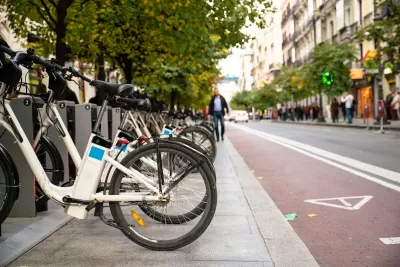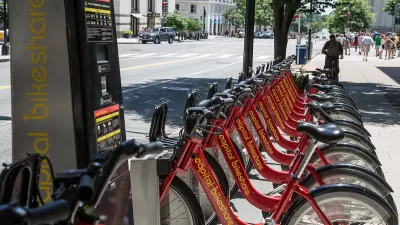Research reveals that shared bikes and scooters are often a crucial lifeline for low-income workers, signaling a need to include micromobility in the larger public transit conversation.

A study of survey data from the United States, Australia, and New Zealand sheds light on how low-income people use shared micromobility services, indicating an opportunity for cities to improve transportation services for the workers who need them most.
Kea Wilson outlines the findings in Streetsblog USA, writing, “Participants in the Lime Access program, which grants discounts of around ‘70 or 80 percent’ to riders who qualify, were significantly more likely to list essential reasons like ‘shopping’ for groceries (35 percent) and ‘commuting’ (31 percent) than non-Access riders, 11 and 21 percent of whom rode to complete errands or go to work, respectively.”
The study found that lower-income users were very unlikely to use shared mobility for non-essential reasons. “And a whopping 44 percent of their trips connected to a traditional transit ride, compared to just 23 percent of people who paid full price.”
As Wilson notes, “Perhaps the most surprising findings, though, were riders' qualitative responses about what micromobility meant to them, and how their lives were made better by having access to affordable ways to get around without a car.” According to Calvin Thigpen, director of policy research for Lime and co-author of the report, “People are using this to get around for pivotal trips; they are heavy, often daily users.”
However, most U.S. bike share systems are not subsidized by public funding, meaning any equity programs cut into the operators’ profit margins. Planetizen recently covered Houston BCycle’s decision to shut down that program due to funding problems. For Thigpen and other advocates, this signals a need to support and fund shared mobility programs as an integral component of an accessible, comprehensive public transit system.
FULL STORY: Study: How Low-Income People Really Use Micromobility

Maui's Vacation Rental Debate Turns Ugly
Verbal attacks, misinformation campaigns and fistfights plague a high-stakes debate to convert thousands of vacation rentals into long-term housing.

Planetizen Federal Action Tracker
A weekly monitor of how Trump’s orders and actions are impacting planners and planning in America.

San Francisco Suspends Traffic Calming Amidst Record Deaths
Citing “a challenging fiscal landscape,” the city will cease the program on the heels of 42 traffic deaths, including 24 pedestrians.

Defunct Pittsburgh Power Plant to Become Residential Tower
A decommissioned steam heat plant will be redeveloped into almost 100 affordable housing units.

Trump Prompts Restructuring of Transportation Research Board in “Unprecedented Overreach”
The TRB has eliminated more than half of its committees including those focused on climate, equity, and cities.

Amtrak Rolls Out New Orleans to Alabama “Mardi Gras” Train
The new service will operate morning and evening departures between Mobile and New Orleans.
Urban Design for Planners 1: Software Tools
This six-course series explores essential urban design concepts using open source software and equips planners with the tools they need to participate fully in the urban design process.
Planning for Universal Design
Learn the tools for implementing Universal Design in planning regulations.
Heyer Gruel & Associates PA
JM Goldson LLC
Custer County Colorado
City of Camden Redevelopment Agency
City of Astoria
Transportation Research & Education Center (TREC) at Portland State University
Jefferson Parish Government
Camden Redevelopment Agency
City of Claremont





























